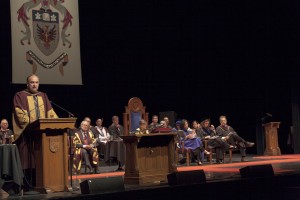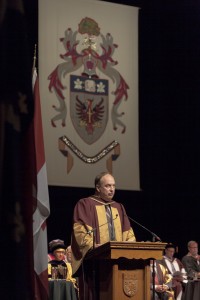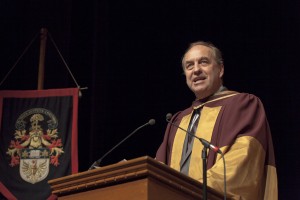Science in our Society — Thank you McMaster University
Today I had the enormous honour of being awarded an honourary Doctor of Science degree from McMaster University in Hamilton, Ontario (I also gave a seminar at the McMaster Centre for Climate Change and the School of Geography and Earth Sciences in the afternoon). This is an incredible honour especially since McMaster has such a fine reputation as one of Canada’s leading institutions for scientific research. Below is a copy of my acceptance speech which touches upon the importance of evidence-based decision-making and the critical role that science plays in informing, rather than prescribing, policy.
McMaster University DSc Acceptance Speech
A video of this speech is available on YouTube (from 20:25 to 31:45)
Chancellor Labarge, President Deane, honoured guests, members of the governing bodies, faculty, students and friends.
It is an enormous honour for me to stand before you today and accept this Honourary Doctor of Science Degree from McMaster University. I wish to express my sincerest thanks to those who nominated me for this distinction.
 Ever since I was a little boy, I have always been fascinated by the wonders of science. I grew up in Victoria, British Columbia on the west coast of Canada — the eastern boundary of the Pacific Ocean. Like many my age at the time, I was enthralled by Jacques Cousteau and his undersea adventures. I remember being in grades 2 and 3 and asking Santa Claus for books about the oceans. Little did I know, I would end up spending much of my career studying the role of the ocean in past, present and future climate change and climate variability.
Ever since I was a little boy, I have always been fascinated by the wonders of science. I grew up in Victoria, British Columbia on the west coast of Canada — the eastern boundary of the Pacific Ocean. Like many my age at the time, I was enthralled by Jacques Cousteau and his undersea adventures. I remember being in grades 2 and 3 and asking Santa Claus for books about the oceans. Little did I know, I would end up spending much of my career studying the role of the ocean in past, present and future climate change and climate variability.
Science plays a critical role in our society. It is the catalyst for innovation and discovery that has enabled us to evolve over the last several millennia from living in small villages and towns supported by subsidence farming to the globally-connected internet age of today.
Before exploring the importance of science in modern society in more detail, please let me differentiate between the different categories of research.
Scientific research is typically conducted within one of three different settings: universities (which many of you are familiar with), federal and provincial government laboratories or industry. Research in each of these different settings is governed by different overarching mandates.
University research is typically curiosity-driven. Individual researchers seek to answer scientific questions that interest them. They apply for grants to support their research and they are expected to disseminate their results to diverse audiences. Over the years, their research interests will move from one subject to another as they seek to explore new scientific issues. However, it is this curiosity-driven research that typically leads to the greatest scientific discoveries.
Tenured university scientists are protected by academic freedom that is an essential and founding principle of the university system. Academic freedom protects the researcher from being able to speak his or her views freely without fear of retribution from those who govern the university.
Federal and provincial government research, on the other hand, is almost always targeted and mission-oriented. It is science that is typically conducted in the service of and for society. For example, Natural Research Canada’s Canmet-MTL lab, located in McMaster’s innovation park, has a mandate to develop and deploy technologies to improve all aspects of producing and using value-added products derived from metals and minerals.
Another example comes from Agriculture and Agri-Food Canada that has 19 research centres across Canada each with their own different focus. In St. John’s, Newfoundland and Labrador, for instance, the Atlantic Cool Climate Crop Research Centre has a mission to “develop technologies which diversify and add value to rural economies in cool summer regions.”
The third category of scientific research involves industry. Here research is normally conducted in order to sustain market competitiveness or to increase shareholder value. Shareholder investments and corporate loans or profits provide the revenue for industry research.
Industry research is less accessible to the public. For example, we would expect the taxpayer to have access to the results from federally funded health research on any potential side effects of a particular drug. However, a start up biomedical drug-company would likely not want to publicly disclose all of its research until patents protected its products.
The distinction between public and privately funded research becomes a little blurry in the area of university-industry partnerships. University researchers are often asked to sign confidentiality agreements when they engage in research in collaborative projects with industry. Yet very often, industry contributions to a research program are matched by funds from government granting agencies. It is difficult to determine what if any of this research should be publicly available. And there is a growing, and some would argue disturbingly so, trend towards the requirement of more and more industry funding as part of any university-based application for research funding from one of our federal scientific research granting councils.
In recent years, the ability of federal government scientists to freely speak about their science has been severely limited. This is deeply troubling for two reasons.
First, the taxpayer ultimately funds the research conducted in federal laboratories. Without access to the scientific results, the taxpayer is unaware of their existence making it easier for the federal government to scale back its in-house research capacity. Second, the taxpayer will not have access to what could be crucial information that would allow them to form an opinion on any given societally relevant issue such as food production, resource extraction or global warming.
Now, more than ever, it is critically important for academics and you, the graduating class of 2014, to engage people in discussions about the value of science in our society. Federal government and curiosity-driven university science is under threat. And it needs the support of all of us.
 Science is a way of thinking. It’s a way of understanding a particular phenomenon by developing an explanation of all known observations of that phenomenon. Yet science that isn’t effectively communicated is ineffective science. The greatest lab bench scientific discovery in the world is entirely useless, unless it is effectively communicated to others who are then able to also see its greatness.
Science is a way of thinking. It’s a way of understanding a particular phenomenon by developing an explanation of all known observations of that phenomenon. Yet science that isn’t effectively communicated is ineffective science. The greatest lab bench scientific discovery in the world is entirely useless, unless it is effectively communicated to others who are then able to also see its greatness.
But remember, whether scientific research is undertaken in industry, government or university based facilities, makes little difference as to its role in the formulation of policy.
Science can never be used to prescribe a particular policy. However, science is able to examine the implications of various policy options. Policy can also be developed or modified to reflect the latest science. In the end, the formulation of policy requires engaging a variety of stakeholders including special interests, religious groups, and industry. It also requires dealing with ethical, political, legal, financial and social issues including any potential application of the precautionary principle.
Science should feed into policy discussions, but in and of itself science cannot and should not dictate what policy directions should be taken. At the same time, science and scientific uncertainty should not be deliberately misrepresented or suppressed by special interests in order to influence public policy in a particular direction. And as scientists, it behoves us to defend our work to those who ultimately fund it, which, in the case of university and government based research, is the taxpayer.
 Today, more than ever, science has an important role to play in our society as the world grapples with grand challenges like global warming, feeding the world’s ever growing population and transforming our energy systems into those that are more sustainable. Yet today, like never before, science and its role in society are under threat. Please let me explain further.
Today, more than ever, science has an important role to play in our society as the world grapples with grand challenges like global warming, feeding the world’s ever growing population and transforming our energy systems into those that are more sustainable. Yet today, like never before, science and its role in society are under threat. Please let me explain further.
As I mentioned earlier, in science one develops theories to explain all known observations of a particular phenomenon. Science has an important role to play in what I like to term evidence-based decision-making. Yet science can be inconvenient to what I like to refer to as decision-based evidence making. Decision based evidence making involves taking an ideological position and searching for evidence to support the ideological position while conveniently ignoring information that would undermine it.
Not only does science have an important role to play in informing policy, but scientists have an important role to play in our political arena.
And that’s not just about voting today in your provincial election!
In law, the person with the most convincing argument wins a debate. In science, the person with the most convincing evidence wins the debate. I believe that we have too many lawyers and not enough scientists in politics and I hope that a number of you will consider putting your scientific talents to work in the political realm in the years ahead. It’s not for everyone. But we need more evidence-based decision makers in our democratic institutions.
I still have those books on the ocean that Santa Claus gave me back when I was in Grades 2 and 3. They are proudly displayed in my library and I frequently look at them and reminisce. While they may be outdated because of the incredible advances in ocean science that have occurred in the last several decades, one thing hasn’t changed. And that’s my fascination in the wonders of science.
I hope that you the grad class of 2014 also live a lifetime enjoying the wonders of science and the excitement of communicating your love of science to those around you. But don’t forget to remember those professors, teachers, friends and family members who were there for you when you needed them. And every once in a while, thank them – because your success is also their success.






4 Comments
I was very glad to have a scientist heavily involved in climate change as the guest speaker at my convocation. As someone who just started graduate school, it was quite informing to hear about the role of science in policy.
I attended your seminar as well and again you mentioned the need to take advantage of our democratic rights – to have a say in the world we’ll be inheriting. You convinced me to put in the effort and get the proper paperwork to vote. Thanks!
You can’t imagine the pride I feel when ready this post and your speech. I grew up a child of McMaster’s science program via its medical school. My dad was a teacher there, then Associate Dean. Fast forward to the BC Green’s AGM one year ago: my father’s joy at the emphasis on evidence-based decision making. Politics that make sense. And now his son is stepping out of his comfort zone with an MSc. That your inspiration and “scienctists-not-just-lawyers” conviction grows nationally finding you in my home town … well it bolters my hope for our country.
Sincere congratulations Andrew on this well-deserved recognition. Sorry to have missed attending but I had a previous commitment. Excellent acceptance speech
Many thanks Harry.